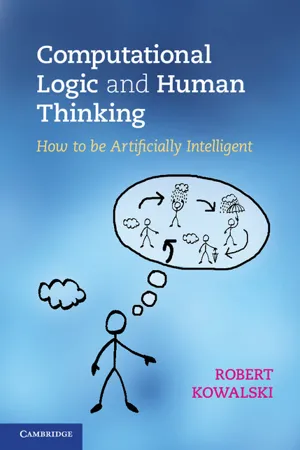
- English
- PDF
- Available on iOS & Android
About this book
The practical benefits of computational logic need not be limited to mathematics and computing. As this book shows, ordinary people in their everyday lives can profit from the recent advances that have been developed for artificial intelligence. The book draws upon related developments in various fields from philosophy to psychology and law. It pays special attention to the integration of logic with decision theory, and the use of logic to improve the clarity and coherence of communication in natural languages such as English. This book is essential reading for teachers and researchers who may be out of touch with the latest developments in computational logic. It will also be useful in any undergraduate course that teaches practical thinking, problem solving or communication skills. Its informal presentation makes the book accessible to readers from any background, but optional, more formal, chapters are also included for those who are more technically oriented.
Frequently asked questions
- Essential is ideal for learners and professionals who enjoy exploring a wide range of subjects. Access the Essential Library with 800,000+ trusted titles and best-sellers across business, personal growth, and the humanities. Includes unlimited reading time and Standard Read Aloud voice.
- Complete: Perfect for advanced learners and researchers needing full, unrestricted access. Unlock 1.4M+ books across hundreds of subjects, including academic and specialized titles. The Complete Plan also includes advanced features like Premium Read Aloud and Research Assistant.
Please note we cannot support devices running on iOS 13 and Android 7 or earlier. Learn more about using the app.
Information
Table of contents
- Cover
- Computational Logic and Human Thinking How to be Artificially Intelligent
- Title
- Copyright
- Contents
- Preface
- Summary and plan of the book
- Introduction
- 1 Logic on the Underground
- 2 The psychology of logic
- 3 The fox and the crow
- 4 Search
- 5 Negation as failure
- 6 How to become a British Citizen
- 7 The louse and the Mars explorer
- 8 Maintenance goals as the driving force of life
- 9 The meaning of life
- 10 Abduction
- 11 The Prisoner’s Dilemma
- 12 Motivations matter
- 13 The changing world
- 14 Logic and objects
- 15 Biconditionals
- 16 Computational Logic and the selection task
- 17 Meta-logic
- Conclusions of the book
- A1 The syntax of logical form
- A2 Truth
- A3 Forward and backward reasoning
- A4 Minimal models and negation
- A5 The resolution rule
- A6 The logic of abductive logic programming
- References
- Index